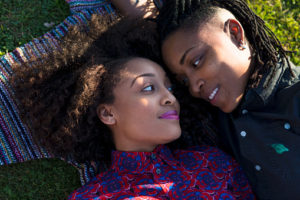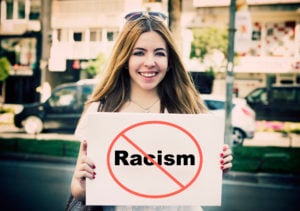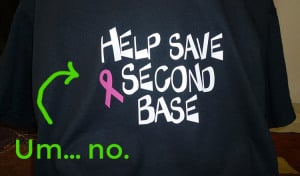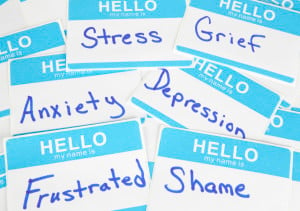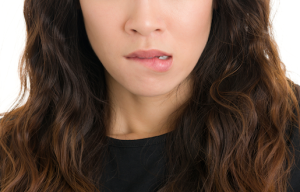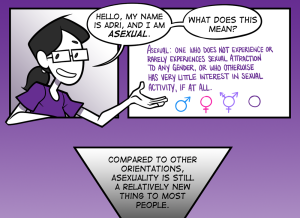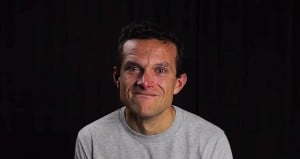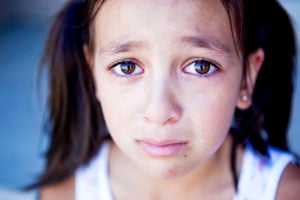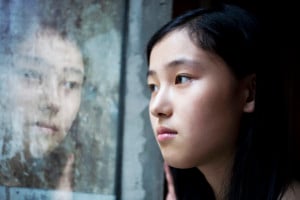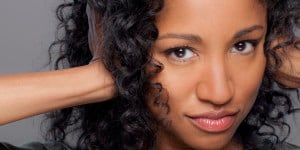(Content Note: sexual violence, anti-bisexual stigma)
I was hanging out with a friend and a guy we knew on campus one night in undergrad.
Like so many other straight, cisgender guys, he began asking detailed questions about my relationship with my girlfriend. “Have you always been gay?” he asked.
“Actually, I’m bisexual,” I said.
Unless I’m concerned about my safety, I’m usually upfront about my sexuality, because dispelling myths about bisexuality and its existence is important to me. (I actually identify as queer, but I usually only say that if I’m ready to have a nuanced conversation about gender identity.)
He immediately began asking me about threesomes: if I’d ever have one, if my girlfriend would be up for one, if I’d do one with a straight female friend. It was clear what his hopes were here – to get me to agree to a threesome with him and literally any other woman.
I felt gross and uncomfortable as soon as he said it.
I like talking about sex and its complexities, threesomes included, with my sex positive friends who are respectful of my sexuality and who just want to engage in a conversation about our likes and dislikes.
Consent is key in these conversations.
They aren’t meant as a space to be judged or shamed, but to openly discuss the nuances of sex and sexuality. We’re the ones leading them, and we can stop them as soon as we feel uncomfortable.
Although I didn’t know it at the time, our conversation made me feel awkward because it was rooted in rape culture.
It was all about this guy getting what he wanted while I was essentially reduced to a sex object, along with my girlfriend and several friends.
My consent – nor the consent of any of the other women in this imagined threesome – was never even considered in this fantasy.
Many of the false ideas commonly associated with bisexuality come down to centering men, with the idea that everyone should be (and wants to be) with men, and that our sexuality is all about the male gaze.
Here are some common ways you may be stereotyping bisexual people – and how those stereotypes feed into rape culture.
1. Bisexual People Just Want to Have Sex with Everyone
This goes along with the above quite common assumption that we’re down for threesomes – especially women and femme folks.
It promotes the idea that if you’re bisexual, you’re “easy” and will have sex with anyone.
There are bisexual folks who want to have sex with multiple partners and those who don’t (including those who are on the asexual spectrum, and aren’t really interested in sex).
But the bottom line is: It’s our choice to consent, every time. And we deserve to have our boundaries respected.
This stereotype, however, is usually based on the idea that just because someone is attracted to multiple a/genders, they’re open to sex all the time, with everyone.
This comes up a lot in the kind of scenario I described above, where a straight man is using bisexual or queer women or femmes as sex objects.
In these cases, it’s not about the bisexual person’s boundaries, desire, or consent. They’re simply a part of a sexual fantasy in which women and femmes are openly available for men and for the male gaze.
This situation could be empowering and exciting for a bisexual person who’s into it, since there are plenty of folks who really enjoy sex with multiple partners at once. But instead, it’s just for the benefit of the men involved.
Even in commonly portrayed fantasies of groups with more than three partners, the sex is usually all about the male gaze, and women’s sexuality is little more than a convenient plot point.
We’re allowed to be “bisexual” in the sense that we’re having group sex with other women, but it’s not about our desire for those women – it’s about the male desire for women’s bodies.
And non-binary people are usually completely left out of this binary view of sexuality.
2. Bisexual People Will Return to Men Eventually
I’ve heard the idea that all bisexual people want to “return to men” from both femmes and masculine bisexual folks.
In this stereotype, bisexual men are “really just gay,” and bisexual women are simply straight.
Not only does this stereotype uphold patriarchy and the gender binary, but it also feeds into rape culture with the idea that men hold all the power and consent in a romantic or sexual relationship.
It doesn’t matter what bisexual folks are saying in this situation, because of course they just want to end up with men, anyway.
When you insist that bisexual people want to return to men, you’re taking away the agency and consent of the bisexual person involved, because you’re defining their sexuality based on your own false assumptions.
You’re also completely erasing bisexuality as its own valid identity.
And you’re trapping bisexual people in rape culture that insists that our bodies and our consent are the property of men.
This stereotype also encourages a perception that women’s bodies are men’s to control.
Bisexual women face high rates of intimate partner violence, and many women survivors deal with abusive men who use their bisexuality against them – sex-shaming them and relying on anti-bisexual myths to keep them silent.
3. Bisexual People Can Be ‘Turned Straight’ with Sex
This stereotype is downright disrespectful.
It implies that bisexuality is a problem, something to be “fixed,” and that sex (or sexual violence) can be a way to change bisexual folks’ sexualities.
The same stereotype is often applied to lesbians, and any women or femmes who don’t identify as straight.
It’s rooted in rape culture because it hinges on the idea that all a woman or femme needs is some sex. Or in some cases, sexual violence – like when someone implies that “she can be raped straight.”
This usually involves sexual violence enacted by a man to “cure” queer women of any sexual desire for people of other genders.
Sexual violence is never okay, and neither sexual violence nor consensual sex can change someone’s sexuality.
Some people’s sexualities may be fluid and shift over time, but it’s not something that a hot night in the bedroom with a man is going to automatically change.
Suggesting that all a woman needs is sex with a man turns her into an object and not a person capable of making her own consensual choices about her body.
4. Femme Bisexual Folks Need to Experience a Man to Identify This Way
I’ve heard so many variations of this over the years, from the above point that sleeping with a man will “turn me straight,” to people just assuming that I can’t identify as bisexual unless I have sex with men.
This has always taken me aback because I’ve never seen a straight friend questioned about whether she’s actually straight if she hasn’t had sex with a man yet.
Odd, right? This has a bit to do with biases against bisexuality, and a little to do with rape culture.
Asserting that a woman or femme needs to have sex with a man to claim her identity pretty much says that we’re not capable of making our own decisions or trusting our own judgment until we’ve “been there.”
Why isn’t it possible for a woman to know she’s bisexual without “proving it” through sex with a man (which also completely leaves out asexual people, and anyone who chooses to abstain from sex or has to for medical reasons)?
In addition to being a part of rape culture, this adds to general judgments against bisexuality because of the assumption that people can’t be genuinely attracted to multiple a/genders.
5. Bisexual People Are Going Through a Phase
Similar to the idea that all bisexual folks need is to go back to men, we’re often told that we’re just going through a phase.
This seems to happen incredibly often to young women and femmes, which suggests that it might just have something to do with society’s resistance to letting us define our own sexuality.
I started the coming out process when I was ten.
I knew by that time that I liked other girls romantically, and I was confused about guys. At thirteen, when I officially started telling family and friends that I was bisexual, I was met with this opposition: “You’re too young to know that. It’s probably a phase!”
This phrase can follow women through high school, college, and even beyond, as if we aren’t capable of knowing ourselves and expressing our own identities.
Of course, some people may not know their sexuality when they’re ten or even 25, but it’s really disrespectful to make that assumption for someone else.
Young women are put down throughout our adolescent lives for expressing our desires, fears, and hopes.
There’s no direct link from someone saying “It’s just a phase” to also saying “Are you sure it was rape? What were you wearing?” but they have something in common: They’re making the assumption that women and femmes don’t know what we’re experiencing and that our reality isn’t truth.
My friends and family were well-meaning in saying my sexuality was just a phase. They didn’t want me to come out in a harsh world and have a difficult teen experience.
But they also subconsciously taught me to doubt myself and to be afraid of telling others – especially adults – what I was feeling.
These fears led to me later not opening up about my sexual assault in high school, because I was afraid I wouldn’t be believed, especially since my assailant was a woman.
When you doubt people, especially younger people and femme folks, after they tell you a truth about their identity, you’re giving them a reason to think that what they’re feeling may not be accurate.
They might go from questioning whether they really know their sexuality to questioning whether they really know if it’s wrong if they’re later sexually harassed or assaulted.
***
All stereotypes hurt bisexual and queer people.
Of course they do because they’re just that: stereotypes.
They don’t represent all of us, and even in the small instances where they might represent someone (if a specific bisexual person loves threesomes, for example), they still don’t tell a complete, nuanced picture of who that person is.
They’re oversimplifications that break people down into easily digestible pieces, and make it easier for things like systemic oppression, microaggressions, and rape culture to run rampant.
When I came out, I also learned to doubt myself.
I learned that people didn’t think my sexuality existed and that I could be changed by having sex with men. I learned that my consent and my desires didn’t matter, because as a bisexual femme, I was the perfect wet dream for straight guys’ fantasies.
All of these things made my coming out process so much harder. I was in college before I really felt like I could settle on saying “I’m queer” and stick by that.
The rape culture tied up in all these stereotypes made it harder for me to realize I’d been sexually assaulted in high school because I believed I might be silenced or told I was over exaggerating, especially because my attacker was a woman.
It made it more difficult for me to deal with being sexually assaulted, and later, with becoming a rape survivor in college.
It wasn’t until I was exposed to learning about – and unlearning – rape culture that I started to speak out about my experiences.
Not all of these stereotypes draw a straight, easy line directly to someone being a victim of sexual violence, but many of them involve aspects of rape culture, like harassment, gaslighting, victim blaming, sex shaming, sexual violence or sex as a “cure,” and objectifying women and femmes.
They’re intrinsically a part of our culture and how we stereotype bisexual people, and that needs to stop.
[do_widget id=’text-101′]
Alaina Leary is a Contributing Writer for Everyday Feminism. She is a Bostonian currently studying for her MA in publishing at Emerson College. She’s a disabled, queer activist and is on the social media team at We Need Diverse Books. She can often be found re-reading her favorite books and covering everything in glitter. You can find her at her website or on Instagram and Twitter @alainaskeys. Read her articles here.
Search our 3000+ articles!
Read our articles about:
Our online racial justice training
Used by hundreds of universities, non-profits, and businesses.
Click to learn more


